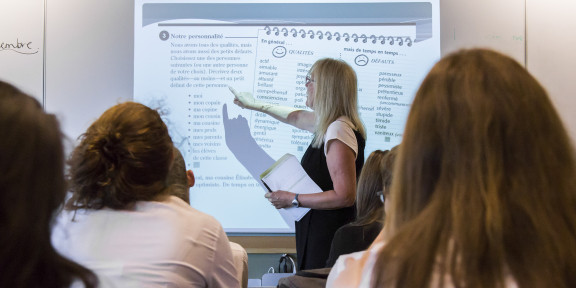50p

Academics 2013-14
As September begins and another school year rolls around I am usually asking myself the question “So, what will be different this year?” In amongst the answers are the new student faces we will greet in our classrooms and new colleagues we will also be helping to make the adjustment to life at Brentwood.
This year we also begin to implement our strategic plan for the school, a plan that has three primary academic objectives under the umbrella goal of becoming a “leading edge place of learning”. First, we are seeking to develop a coordinated professional development strategy that allows teachers time to workshop with each other and beyond the school, fostering a culture of even more professional growth and collaboration. Our ambition is for Brentwood to become a center for teacher conferences, educational research and a place to observe best practices in the field of teaching.
Second, we are looking to further infuse our curriculum with modules that exemplify the very best traits of modern teaching and learning. Revamping and evolving our curriculum will also require a teamwork approach as we connect together in departments, subject and grade groups. Projects that develop student skills, promote technological competencies and inspire a more authentic, student-centered approach to learning are high on the list of priorities.
Third, we plan to support our students in a variety of new ways with, for example, a greater emphasis on study skills, more access to learning assistance, and a fostering of enrichment opportunities, both within and beyond the school and regular curriculum. It will require imagination, commitment over and above our regular day, a lot of creative endeavor and a “growth mindset” to see it through.
Last Friday, we made a start towards these lofty goals with a day of professional development as a faculty engaging with an excellent guest speaker, Mr Tom Schimmer, a former teacher, principal and now a full-time educational consultant and international presenter. His topic for our full-day seminar was assessment and his perspective was a fascinating one. It confirmed many of our notions about formative assessment, the feedback process that students and teachers generate during class time. Teachers constantly gauge student understanding in a variety of ways, but the importance of this and its overlap into the field of “homework” was news to many.
Practical ways to give thought-provoking and rapid feedback on written work were described and directed to departments in small groups as they discussed the main ideas of the day. Research apparently shows that the better the formative assessment process, the better the results on summative assessments (unit tests or exams). Grading and reporting practices were also discussed and the importance of emphasizing the “most recent” and “most frequent” evidence of learning as opposed to taking the “mean average” of all marks as is commonly practiced. This emphasizes the growth that students show over the year and enables us to more accurately assess how well they have mastered the learning outcomes.
Our follow up to the day will be to formulate a school wide philosophy on assessment, reporting and grading with departments framing their own guidelines to assist their members in the important task of assessing student learning and reporting it accurately to parents and other constituents.
Mr. David McCarthy, Director of Academics